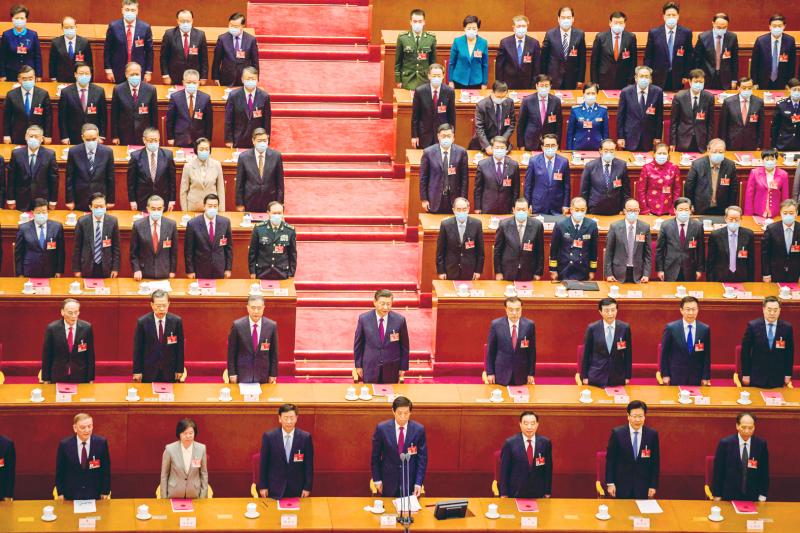The Chinese Communist Party’s (CCP) four-day plenum to begin today is expected to lay the groundwork for Chinese President Xi Jinping (習近平) to extend his leadership at next year’s National Congress for an unprecedented third term, the Mainland Affairs Council (MAC) said in a report recapping statements that could hint at the party’s policy direction.
From today to Thursday, more than 370 members of the CCP’s 19th Central Committee are to converge on Beijing for its sixth plenary session, when major policy decisions are typically made in closed-door meetings.
The council on Friday last week submitted a report to the Legislative Yuan’s Internal Administration Committee.

Photo: AFP
In the report, MAC Minister Chiu Tai-san (邱太三) highlighted Xi’s recent statements that might provide insight into the next few years of CCP policy if Xi can maintain power.
Chiu is to attend a meeting of the committee at the legislature today.
Xi in his CCP centenary address on July 1 called on Chinese not to shy away from struggle over the next 100 years, after extolling what he called the virtues of single-party rule, the council said.
Meanwhile, CCP leaders have billed themselves as China’s best foreign relations asset in these volatile times, it said.
Disputes with the US over the origins of SARS-CoV-2, Taiwan, Hong Kong, human rights and other issues are coming to a head, even while the two governments manage to maintain communications on issues of mutual importance, such as trade, climate change, Afghanistan and North Korea, it added.
This is happening against the backdrop of greater international worry regarding the cross-strait situation, with officials from the US, Japan, the EU, the UK, Germany, Australia and South Korea voicing their concerns, it said.
Multilateral organizations such as the G7, the Quadrilateral Security Dialogue and NATO have also directly addressed the importance of maintaining peace and stability across the Taiwan Strait, it added.
The CCP has continued solidifying diplomatic and trade links with other countries to expand its global influence and sow division between the US and its allies, the council said, citing Beijing’s Belt and Road Initiative, vaccine diplomacy and its application to join the Comprehensive and Progressive Agreement for Trans-Pacific Partnership.
It is using UN Resolution 2758 and its “one China” principle to confuse people about cross-strait issues and limit the scope of Taiwan’s international participation, the council added.
Regarding cross-strait relations, Xi has made clear that he has prioritized solving the “Taiwan problem,” such as in his July 1 speech and in remarks commemorating the 110th anniversary of the Xinhai Revolution on Oct. 9, the council said.
Xi has said that achieving the “complete reunification” of the motherland is the “historic mandate” of the CCP, it said.
He has also reiterated the idea of “peaceful reunification under one country, two systems,” as well as cross-strait development based on its “one China” principle and the so-called “1992 consensus,” it added.
Xi also vowed to “smash” attempts at formal independence for Taiwan, while calling on others “not to underestimate Chinese’s strong determination, firm will and formidable ability to defend national sovereignty,” the council said.
As a responsible regional player, Taiwan would continue to pay close attention to the direction of the CCP’s policy, the council said, calling on Beijing to abandon its political framework and coercive behavior toward Taiwan.
Only pragmatic and constructive dialogue can create favorable conditions for the resumption of relations after the COVID-19 pandemic in pursuit of positive cross-strait development, the council said.

Alain Robert, known as the "French Spider-Man," praised Alex Honnold as exceptionally well-prepared after the US climber completed a free solo ascent of Taipei 101 yesterday. Robert said Honnold's ascent of the 508m-tall skyscraper in just more than one-and-a-half hours without using safety ropes or equipment was a remarkable achievement. "This is my life," he said in an interview conducted in French, adding that he liked the feeling of being "on the edge of danger." The 63-year-old Frenchman climbed Taipei 101 using ropes in December 2004, taking about four hours to reach the top. On a one-to-10 scale of difficulty, Robert said Taipei 101

Nipah virus infection is to be officially listed as a category 5 notifiable infectious disease in Taiwan in March, while clinical treatment guidelines are being formulated, the Centers for Disease Control (CDC) said yesterday. With Nipah infections being reported in other countries and considering its relatively high fatality rate, the centers on Jan. 16 announced that it would be listed as a notifiable infectious disease to bolster the nation’s systematic early warning system and increase public awareness, the CDC said. Bangladesh reported four fatal cases last year in separate districts, with three linked to raw date palm sap consumption, CDC Epidemic Intelligence

Two Taiwanese prosecutors were questioned by Chinese security personnel at their hotel during a trip to China’s Henan Province this month, the Mainland Affairs Council (MAC) said yesterday. The officers had personal information on the prosecutors, including “when they were assigned to their posts, their work locations and job titles,” MAC Deputy Minister and spokesman Liang Wen-chieh (梁文傑) said. On top of asking about their agencies and positions, the officers also questioned the prosecutors about the Cross-Strait Joint Crime-Fighting and Judicial Mutual Assistance Agreement, a pact that serves as the framework for Taiwan-China cooperation on combating crime and providing judicial assistance, Liang

US climber Alex Honnold left Taiwan this morning a day after completing a free-solo ascent of Taipei 101, a feat that drew cheers from onlookers and gained widespread international attention. Honnold yesterday scaled the 101-story skyscraper without a rope or safety harness. The climb — the highest urban free-solo ascent ever attempted — took just more than 90 minutes and was streamed live on Netflix. It was covered by major international news outlets including CNN, the New York Times, the Guardian and the Wall Street Journal. As Honnold prepared to leave Taiwan today, he attracted a crowd when he and his wife, Sanni,